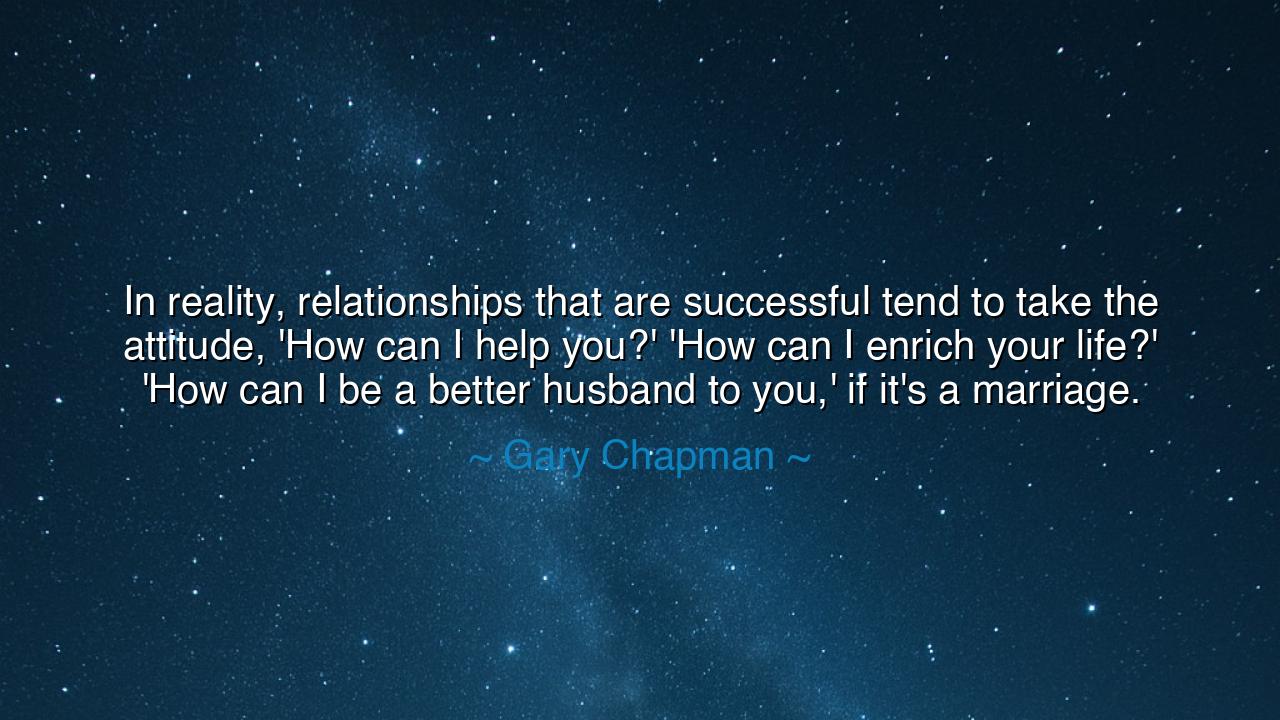
In reality, relationships that are successful tend to take the
In reality, relationships that are successful tend to take the attitude, 'How can I help you?' 'How can I enrich your life?' 'How can I be a better husband to you,' if it's a marriage.






"In reality, relationships that are successful tend to take the attitude, 'How can I help you?' 'How can I enrich your life?' 'How can I be a better husband to you,' if it's a marriage." These words by Gary Chapman offer a profound truth about the nature of successful relationships. At the heart of any strong and enduring relationship—be it marriage, friendship, or family—lies the spirit of selflessness and service. Chapman’s insight reminds us that the true foundation of any union is not one of taking, but of giving. It is not in seeking what we can receive, but in offering what we can give, that we find fulfillment, joy, and lasting connection.
In the ancient world, the great philosophers and thinkers often pondered the nature of love, duty, and commitment. Aristotle spoke of the concept of philia, a type of love that goes beyond mere romantic desire, rooted in mutual respect and the desire to promote the well-being of one another. To love, in Aristotle’s view, was to help the other grow, to seek their flourishing, and to be committed to their happiness. This idea resonates deeply with Chapman’s words, where true love in relationships is defined not by what one can gain, but by what one can contribute to the other’s life.
Consider the timeless example of Socrates and his wife Xanthippe. While historical accounts of their marriage are often filled with humor and even criticism of Xanthippe’s temper, it is said that Socrates was devoted to her in his own way, often thinking of her needs and acting in ways that enriched her life. Though their relationship might not have been perfect by the standards of the world, it showed the depth of Socrates' commitment to his partner. He embodied the principle that the role of a husband, and of any partner in a relationship, is to ask, “How can I serve you? How can I make your life better?”
The marriage of Elizabeth Barrett Browning and Robert Browning is another example of this philosophy in action. While the Browning couple was famous for their intellectual and poetic partnership, their relationship was one deeply founded on mutual support. Robert Browning was deeply devoted to his wife, especially after her health began to fail. In one of her most famous poems, Sonnets from the Portuguese, Elizabeth Barrett Browning wrote of their love and her gratitude for his presence in her life. Robert’s support and devotion to Elizabeth’s work and well-being reflected the attitude that Chapman speaks of: he asked, "How can I enrich her life?" And in doing so, he helped her become one of the most celebrated poets of her time.
When Gary Chapman speaks of the attitude, “How can I help you?” he calls us to reflect on the foundation of love itself. It is a radical concept—one that calls for us to step outside our own desires and to focus, instead, on the well-being of the person we choose to be with. In marriage, as in all relationships, we must ask not, “What do I want from this person?” but rather, “What can I give to this person to make their life better?” Love, in its highest form, is self-sacrificial. It requires that we place the needs and desires of the other above our own, knowing that in doing so, we create a bond that is not only deep but enduring.
The lesson here is one that transcends mere theory and speaks to the practical, everyday choices that we must make in our relationships. If we desire strong and lasting connections with others, we must make a commitment to serve them, to enrich their lives, to ask how we can be better partners, friends, or family members. The truly successful relationship is not the one where each person seeks only their own comfort and satisfaction, but the one where both partners focus on how to give, how to share love, and how to support one another in the most meaningful ways.
As we move through life, let us remember the wisdom of Gary Chapman and those who have come before him. The power of a relationship—be it in marriage or in any form of companionship—lies in the mutual care and service we offer to one another. Let us ask, daily, “How can I enrich your life?” and seek ways to act with selflessness and love. In doing so, we will not only build relationships that last, but relationships that are filled with the kind of deep connection and joy that come from knowing that we are there for each other in every possible way.






AAdministratorAdministrator
Welcome, honored guests. Please leave a comment, we will respond soon